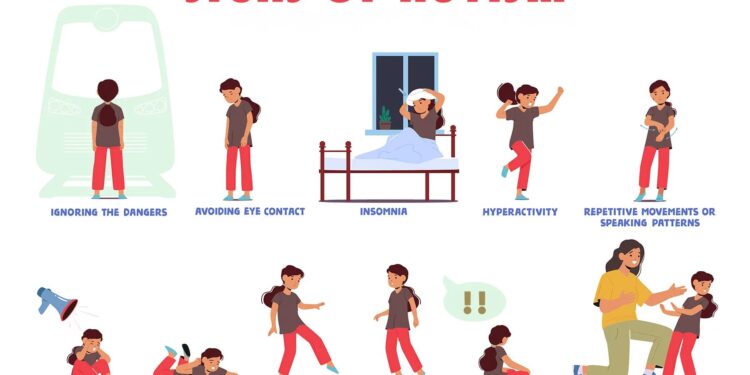In recent public statements, former President Donald Trump has reignited controversy by making claims linking autism, the use of Tylenol, and vaccines-assertions that experts in the scientific community strongly dispute. According to researchers and medical professionals, these statements distort established facts and risk spreading misinformation about critical public health issues. This article examines the claims made by Trump, the scientific evidence that contradicts them, and the potential implications of such misinformation on public understanding and vaccine confidence.
Trump’s Misrepresentation of Autism and Vaccine Science Draws Criticism from Experts
Recent statements made by former President Donald Trump have ignited a wave of criticism from medical experts who accuse him of distorting established scientific consensus regarding autism, vaccines, and common medications like Tylenol. Trump’s claims, which link vaccine usage and the consumption of acetaminophen (Tylenol) to the rise in autism spectrum disorder diagnoses, have been categorically debunked by numerous peer-reviewed studies. Experts emphasize that such assertions not only mislead the public but also undermine decades of vaccine safety research and public health initiatives.
Leading scientific organizations stress the following points:
- There is no credible evidence linking vaccines or Tylenol to autism.
- Autism is a complex neurodevelopmental condition influenced by a combination of genetic and environmental factors.
- Misinformation hampers vaccination programs vital for controlling preventable diseases.
| Claim | Scientific Consensus |
|---|---|
| Vaccines cause autism | Disproved by multiple large-scale studies |
| Tylenol usage linked to autism | No substantial evidence found |
| Vaccination risks outweigh benefits | Vaccinations prevent millions of deaths annually |
Experts Clarify the Lack of Evidence Linking Tylenol and Vaccines to Autism
Medical experts have repeatedly emphasized that there is no scientific evidence supporting a connection between Tylenol (acetaminophen) use, vaccines, and autism spectrum disorder (ASD). Numerous large-scale studies conducted over the past two decades have consistently demonstrated that vaccines are safe and do not increase the risk of autism. The misinformation linking these factors persists largely due to misinformation and a misinterpretation of data rather than any credible research findings.
Leading organizations such as the Centers for Disease Control and Prevention (CDC) and the World Health Organization (WHO) have reinforced this conclusion. Experts highlight key points including:
- Vaccines are extensively tested: Multiple phases of clinical trials ensure safety prior to approval.
- Tylenol is widely used with a robust safety profile: No credible studies link prenatal or early childhood use to autism.
- Autism’s causes are complex and multifactorial: Genetic and environmental factors play significant roles.
| Study | Sample Size | Conclusion |
|---|---|---|
| CDC Vaccine Safety Study (2019) | 650,000 children | No link between vaccines and autism |
| Acetaminophen & ASD Meta-analysis (2021) | 25,000 cases | No causative association found |
| WHO Global Review (2020) | Various | Vaccines confirmed safe & effective |
Health Authorities Urge Public to Rely on Verified Scientific Data Amid Misinformation Concerns
Public health officials are raising concerns over the rapid spread of misinformation linking vaccines, Tylenol, and autism-a narrative repeatedly distorted in recent political statements. Leading scientists emphasize that such claims lack credible evidence and divert attention from critical health interventions. The consensus within the medical community remains clear: vaccinations are safe, effective, and vital for preventing serious diseases, while autism’s origins are complex and not related to either vaccines or common over-the-counter medications like Tylenol.
To combat the misinformation epidemic, experts recommend the public adhere to verified sources and scientific consensus. Health authorities outline key facts to help distinguish truth from misleading claims:
- Vaccines: Extensively studied and monitored for safety, vaccines do not cause autism.
- Tylenol (Acetaminophen): Widely used analgesic with no established link to neurodevelopmental disorders.
- Autism Spectrum Disorder: A complex condition influenced by genetic and environmental factors, not by the aforementioned substances.
| Claim | Scientific Evidence | Expert Conclusion |
|---|---|---|
| Vaccines cause autism | Multiple large-scale studies found no association | False |
| Tylenol linked to autism | Insufficient data, no causal link confirmed | Unsubstantiated |
| Early vaccination harms child development | Extensive safety protocols in place | Misleading |
In Summary
As the debate over vaccines and public health continues to draw intense scrutiny, experts emphasize the importance of relying on verified scientific data rather than politically motivated claims. Scientists caution that misinformation surrounding autism, Tylenol, and vaccines not only undermines public trust but also poses significant risks to community health. In an era where accurate information is crucial, fact-based dialogue remains essential to shaping effective health policies and protecting vulnerable populations.










